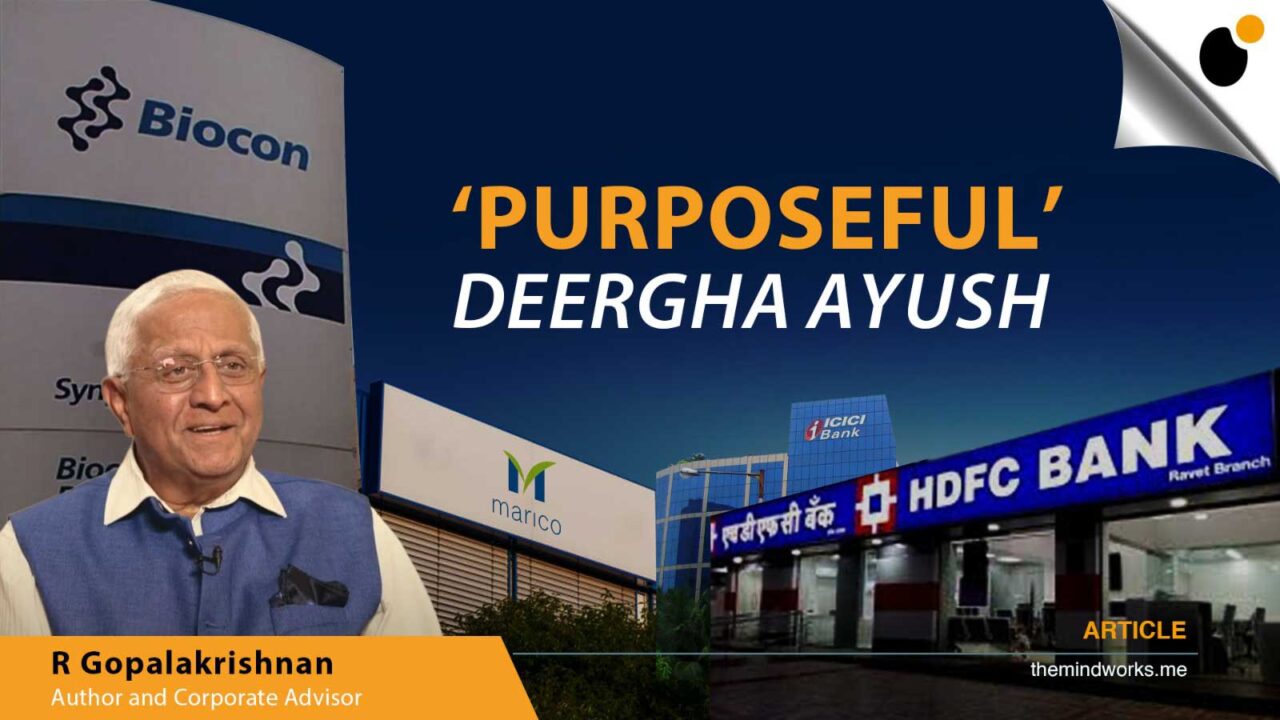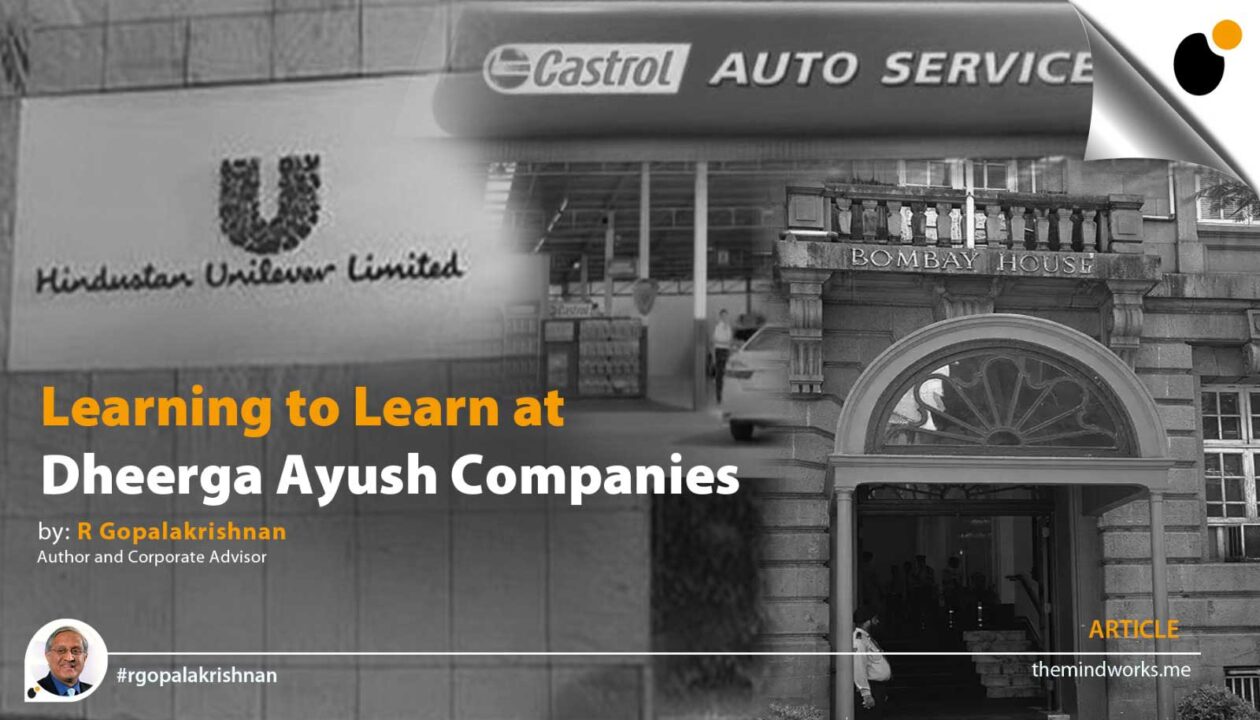TNIE (25)
To appear on 16-6-22
‘Transforming organizations’: a series in New Indian Express.
The role of a collective legend in transformations
By R Gopalakrishnan
(The writer is an author and business commentator. His articles and videos can be accessed on his website www.themindworks.me and his email ID is rgopal@themindworks.me)
(An intellectual nomad is a leader who approaches the transformation challenge with empathy–an open mind, a determination to listen, and a will to relearn old truths.)
In my native Tamil language, a single alphabet like Pa represents four alphabets of Sanskrit pa, pha, ba, bha. The pronunciation in a word is determined by the alphabets that precede and follow. Papa and Baba have the same spelling. What precedes and follows an alphabet determines the word’s meaning and pronunciation. I quote this linguistic as a metaphor for inclusiveness in society—what is adjacent, what precedes and what follows is important to appreciate a person.
Transformations are necessarily painful as I pointed out in this column last month. An important reason for pain is the lack of a collective legend about the future. A collective legend is a distinctive story about the future that has been developed by people on an inclusive basis. The key words in the preceding sentence have been italicized. They are not explained here for want of space and, anyway, they mean exactly what they imply.
A collective legend is an intense and painful democratic process, full of compromises and adjustments. Think about how the Constituent Assembly developed our constitution or how the Nehru-Mahalonobis combination explained planning to the people of India. Inclusiveness means that what is around the person is as important as the person.
Democracy and authoritarianism are not natural companions. In long-surviving organizations, there is likely to be a collective and valuable memory about the past; but as we move from the present to the future, there are likely to be divergent views. We see this in companies, societies, and nations.
At a nation and society level, the divergent views about the present and the future manifest as ethnic or religious narcissism. Leaders hark back to a glorious past and seek to revive the mythical good old days. That is why Putin sees himself as a modern Peter the Great or Boris Johnson sees himself as a new-age Churchill. One religion or ethnic group is proclaimed to be original, and others are portrayed as ‘others’, for example, the fate suffered by the Romani in Hungary.
Integrating a diverse nation or company is not easy. I had two experiences during the 1990s: one in Jeddah, integrating eleven joint ventures in the Middle East into a cohesive Unilever Arabia, and again, in India, integrating eight companies, which were merged to form Brooke Bond Lipton India Limited. Although this column is about corporate experiences, I shall describe the lessons that I learnt in a future article.
Rather I offer an important lesson with a hindsight perspective of the challenges in developing a collective legend. The elephant in the room is that the old is dying, but the new has not yet been born. Transformation represents the interregnum when the individual’s sense of vulnerability increases and when multiple emotions—anxiety, anger, disillusionment—may coalesce into an unhealthy apathy.
In this maelstrom of emotions and vulnerability, you need leaders who are intellectual nomads; without whom, the pain of transformation increases. An intellectual nomad is a leader who approaches the transformation challenge with empathy–an open mind, a determination to listen, and a will to relearn old truths.
In the transition between the old and the new, a planned or inadvertent othering develops between the ‘real’ and the ‘pretenders.’ Every individual wants to be heard, that is a basic human want. Leaders must invest in formal and informal ways to listen; above all, they must be seen to be listening, otherwise, disillusion grows and trust declines among the people. This is understandable because in losing our voice, something in us dies. This can be minimized when leaders reach out and listen, not just widely, but to the weakest members of the ecosystem.
In the 1990s, South Africa was transforming from an apartheid-ridden society to a rainbow society. Nelson Mandela wanted to show support for South Africa in the World Cup Rugby finals at Johannesburg in 1995. Because the Springboks team was historically white, his advisors dissuaded Mandela from attending. Mandela adopted the opposite of their advice by wearing the Springboks jersey and cheering the national team. He demonstrated that othering retards transformation.
When Gandhiji wished to emotionally connect with the common Indian, he shed western attire for the loin cloth, travelled third class, and adopted the spinning wheel. Through his empathy, he managed to touch millions of Indians with his idea of ahimsa. He lived his advice to others, “Be the change you want to see.”
Dr BR Ambedkar passionately believed that India will not reap the real fruits of educational and economic reform if simultaneously, there is no social reform. Possibly he desired national communication and reform efforts on the scale of the subsequent Family Planning and Swachh Bharat efforts. He advocated harmonized social integration efforts, including inter-caste marriages. Instead, over 75 years, India resorted to caste reservations, which perhaps has produced the opposite effect.
When MG Ramachandran proposed the mid-day meal scheme for Tamilnadu schools in the late 1970s–revolutionary for those times—he faced bureaucratic resistance on account of budgets. It is reported that he asked his officers in an emotional tone, “Pasi na ennendu ungallukku theriyuma? Nan thaanga midiyada pasi therinjirken.” This means, have you experienced real hunger? I have experienced unbearable hunger. That did it. Tamilnadu introduced the scheme to great advantages in the 50 years that have followed.
When evaluating the implementation of the Amul model, Lal Bahadur Shastri spent time, including one night incognito, with dairy farmers to personally understand the implications of the Amul experiment started by Dr V Kurien. Indeed, Dr Kurien prided himself to be an employee of the farmers despite his ‘foreignness’ as a Kerala Christian and a foreign-trained engineer.
Companies in our nation, indeed the nation, seek rapid and sustainable growth to alleviate poverty and obscurantism. Our leaders must do more to develop a collective legend and demonstrate empathy for the needs of the people.



